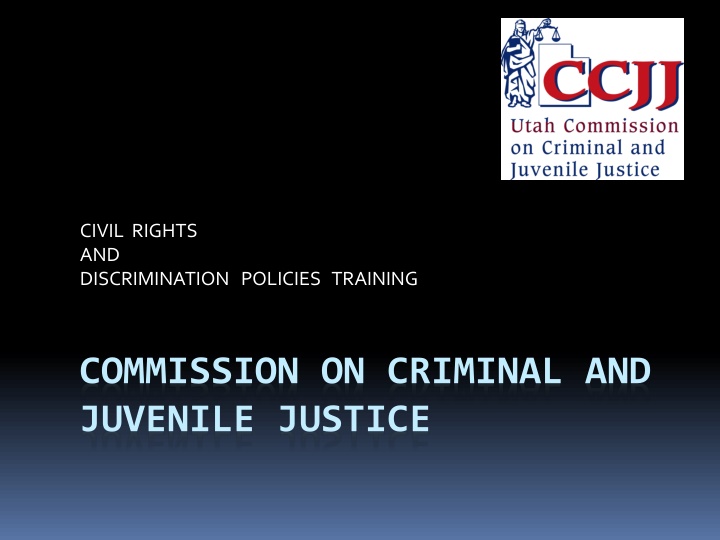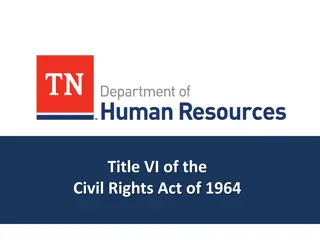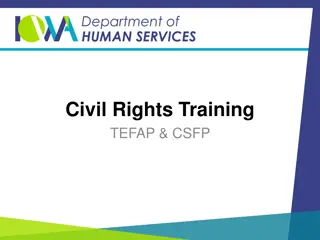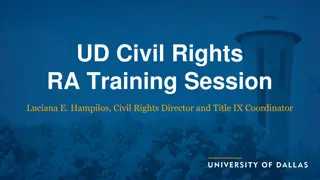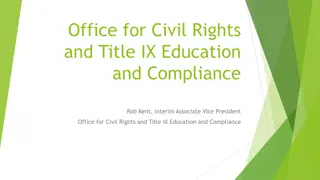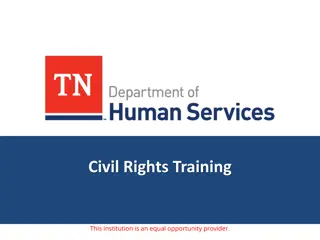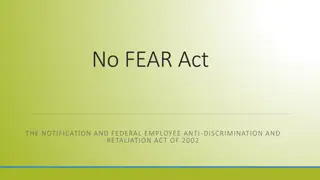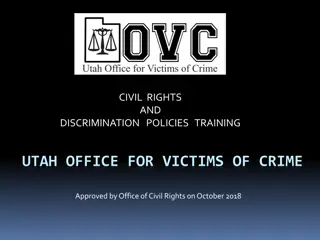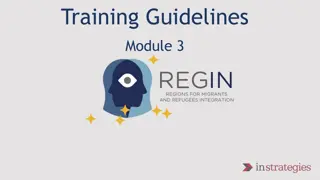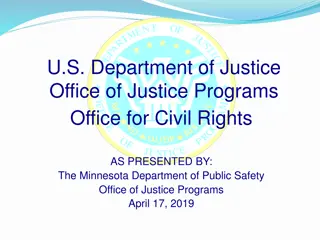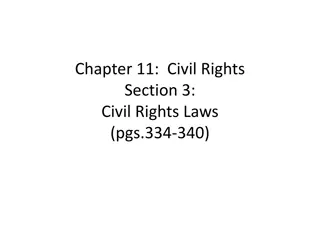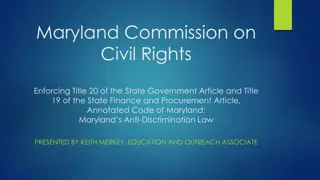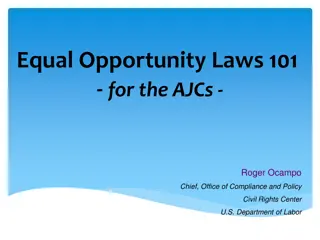Civil Rights and Discrimination Policies Training Overview
This overview provides information on the importance of compliance with civil rights laws in grant programs administered by the State Administering Agency (SAA) and the CCJJ policy statement ensuring equal treatment for all individuals. It emphasizes annual civil rights training requirements, the need for written internal policies on non-discrimination, and the certification process for reimbursement. Subrecipients must uphold standards of equality regardless of race, color, sex, pregnancy, religion, disability, and other protected characteristics to receive grants from CCJJ.
Download Presentation

Please find below an Image/Link to download the presentation.
The content on the website is provided AS IS for your information and personal use only. It may not be sold, licensed, or shared on other websites without obtaining consent from the author.If you encounter any issues during the download, it is possible that the publisher has removed the file from their server.
You are allowed to download the files provided on this website for personal or commercial use, subject to the condition that they are used lawfully. All files are the property of their respective owners.
The content on the website is provided AS IS for your information and personal use only. It may not be sold, licensed, or shared on other websites without obtaining consent from the author.
E N D
Presentation Transcript
CIVIL RIGHTS AND DISCRIMINATION POLICIES TRAINING COMMISSION ON CRIMINAL AND JUVENILE JUSTICE
INTRODUCTION Compliance with Civil Rights It is the responsibility of the State Administering Agency (SAA) to ensure that its grant subrecipients are complying with all applicable federal civil rights laws.
CCJJ Policy Statement All employees, applicants, and program participants of the CCJJ s subrecipients, including clients, customers, or consumers, shall be treated equally regardless race, color, sex, pregnancy, childbirth, or pregnancy-related conditions, age, religion, national origin, disability, sexual orientation, or gender identity. In addition to these, if the subrecipient receives any grants from CCJJ, they are prohibited from discrimination in employment or in the provision of services or benefits, based on actual or perceived race, color, sex, pregnancy, childbirth, or pregnancy-related conditions, age, religion, national origin, disability, sexual orientation, or gender identity.
CCJJ Policy Statement cont. All individuals have the right to participate in programs and activities operated by CCJJ s subrecipients. CCJJ requires all subrecipients to be in compliance with the Legal Sources included in this training.
Civil Rights Training Slides This training must be taken annually and a signed certificate must be submitted with your award document. Please review the following PowerPoint slides regarding potential claims of discrimination. Before your agency can be reimbursed for any expenses associated with this grant, the grant project director must first review and certify compliance with Federal Equal Employment Opportunity policies. After completing the review, print the final slide, the Certificate of Completion, sign and place it in your grant file. The Certificate will be viewed during the monitoring of your grant.
Policy Requirements Subrecipients are required to have a written internal policy on employment discrimination and discrimination in the provisions of services for its employees and program participants. The minimum statement must cover: All employees and applicants of the CCJJ s subrecipients, and clients, customers, program participants, or consumers of subrecipients shall be treated equally regardless of race, color, sex, pregnancy, childbirth, or pregnancy-related conditions, age, religion, national origin, disability, sexual orientation, or gender identity.
The Office for Civil Rights enforces Title VI of the Civil Rights Act of 1964 Program Statutes (e.g., Safe Streets Act, Victims of Crime Act, JJDPA) Section 504 of the Rehabilitation Act of 1973 Title II of the Americans with Disabilities Act of 1990 The Age Discrimination Act of 1975 Title IX of the Education Amendments of 1972 Partnerships with Faith-Based and Other Neighborhood Organizations
Title VI of the Civil Rights Act of 1964 No person in the United States shall, on the ground of race, color, or national origin, be excluded from participation in, be denied the benefits of, or be subjected to discrimination under any program or activity receiving Federal financial assistance. 42 U.S.C. 2000d 28 C.F.R. 42.101 et seq.
Program Statutes --Safe Streets Act, Victims of Crime Act (for subrecipients with VOCA awards ), and JJDPA Prohibits discrimination on the basis of race, color, national origin, religion, or sex, in the delivery of services, benefits, and employment practices in OJP funded programs or activities. 34 U.S.C. 10228 34 U.S.C. 11182(b) 28 C.F.R. 31.202, .403&pt. 42, subptsD&E
Section 504 of the Rehabilitation Act Prohibits discrimination against qualified individuals on the basis of disability in the delivery of services, benefits, and employment practices in OJP funded programs or activities. 29 U.S.C. 794 28 C.F.R. 42.501 et seq.
Title II of the Americans with Disabilities Act of 1990 As it relates to discrimination on the basis of disability in the delivery of services, benefits, and employment practices in OJP funded programs or activities. 42 U.S.C. 12132 28 C.F.R. Pt. 35
The Age Discrimination Act of 1975 As it relates to discrimination on the basis of age in the delivery of services, benefits, and employment practices in OJP funded programs or activities. 42 U.S.C. 6102 28 C.F.R. 42.700 et seq.
Title IX of the Education Amendments of 1972 As it relates to discrimination on the basis of sex in OJP funded training or educational programs, in the delivery of services, benefits, and in employment practices. 20 U.S.C. 1681 28 C.F.R. Pt. 54
Faith-Based Organizations Government agencies must remove barriers for Faith-Based Organizations applying for aid. Government agencies providing financial assistance must not discriminate either in favor or against Faith-Based Organizations. Faith-Based Organizations must not use Federal funding to advance explicitly religious activities. Faith-Based Organizations may not discriminate against beneficiaries based on religion or religious belief.
The Utah Labor Commission enforces The Utah Anti-discrimination Act of 1965 which prohibits employment discrimination on the basis of race, color, sex, pregnancy, childbirth, or pregnancy-related conditions, age, religion, national origin, disability, sexual orientation, or gender identity. Utah Code Annotated, Title 34A Chapter 5
Subrecipients Subrecipients must have procedures in place for accepting and processing discrimination complaints that employees, applicants, clients, and customers file directly with the subrecipient, which may involve investigating the complaint internally or referring the complaint to an appropriate external agency for investigation such as the Commission on Criminal and Juvenile Justice (CCJJ).
CCJJ Procedures When Responding to Claims of Discrimination Step 1 Subrecipients and/or complainants should contact the Complaint Coordinator by telephone, in writing, or by email at: Collett Litchard Commission on Criminal and Juvenile Justice East Office Building, Suite E330 PO Box 142330 Salt Lake City, Utah 84114-2330 801.538.1062 cclitchard@utah.gov
Step 2 Provide Collett with complainants contact information including: Name; Address; Telephone, Cell Phone, Work Phone; Date of Birth; A brief description of the alleged discrimination or civil rights violation; Including the date, place, and time; Names of any Respondents accused of discrimination (if known); A brief description of the communication that has already occurred to address the issue; and Any other relevant information.
Step 3 The Complaint Coordinator will contact complainant within ten (10) business days after receipt of the complaint. The Complaint Coordinator will mail complainant(s) a letter, and where appropriate, in a format accessible to the complainant, such as large print, braille, or audio tape indicating the actions taken in forwarding the complaint to the Utah Antidiscrimination & Labor Division and notification to the Office for Civil Rights.
EQUAL EMPLOYMENT OPPORTUNITY PLANS -- EEOP Every subrecipient of a CCJJ grant must comply with EEOP procedures. EEOP is a workforce report that somemust complete as a condition of a grant award. All subrecipients must complete a Certification Form. Government Agency - Based on: Amount of the award; and Number of employees. Non-Profit Entity Exempt from filing an EEOP; however All EEO Plans and Certifications are to be submitted electronically, preferably through the EEO Reporting Tool at https://ojp.gov/about/ocr/eeop.htm
DOCUMENTS ON FILES You must have on file: EEOP if required Certification Form Section A Completed OR Section B Completed Please consult with your Human Resource Department on requirements All EEO Plans and Certifications are to be submitted electronically, preferably through the EEO Reporting Tool at https://ojp.gov/about/ocr/eeop.htm
CERTIFICATE OF COMPLETION I certify I have reviewed these PowerPoint slides regarding federal grant funded projects, policies and the legal sources that prohibit discrimination and I have the Certification Form on file for viewing. I further certify that I will submit a copy of this signed certificate with the first reimbursement request documentation in GMS. Grant # _____________ Date: _____________ Project Director ______________________ Signature Please print and sign this slide; place it in your grant file for review at monitoring time. A copy of this signed certificate must be submitted with your award document.
